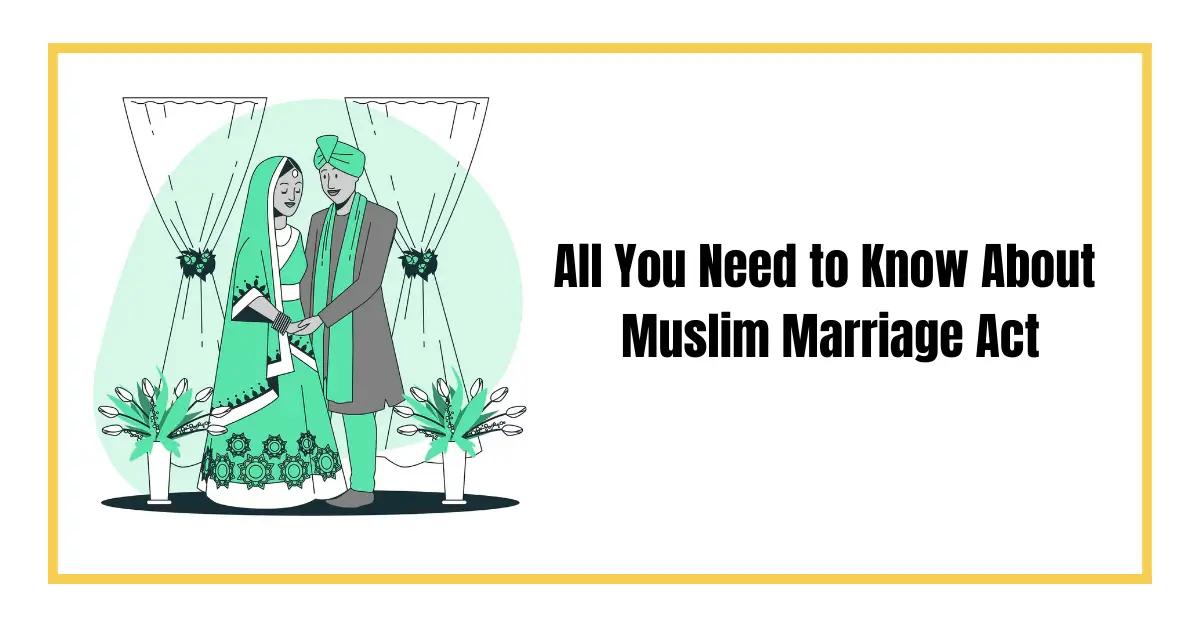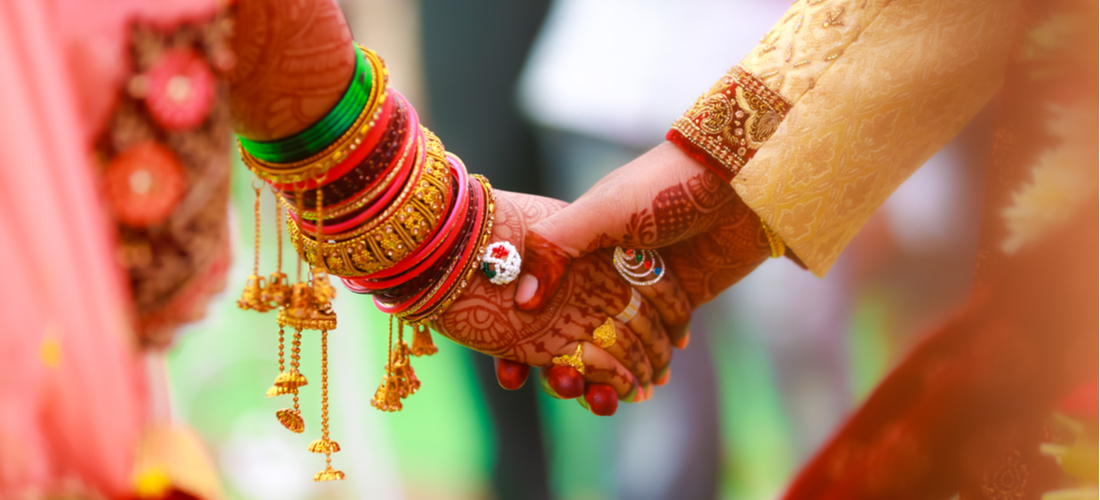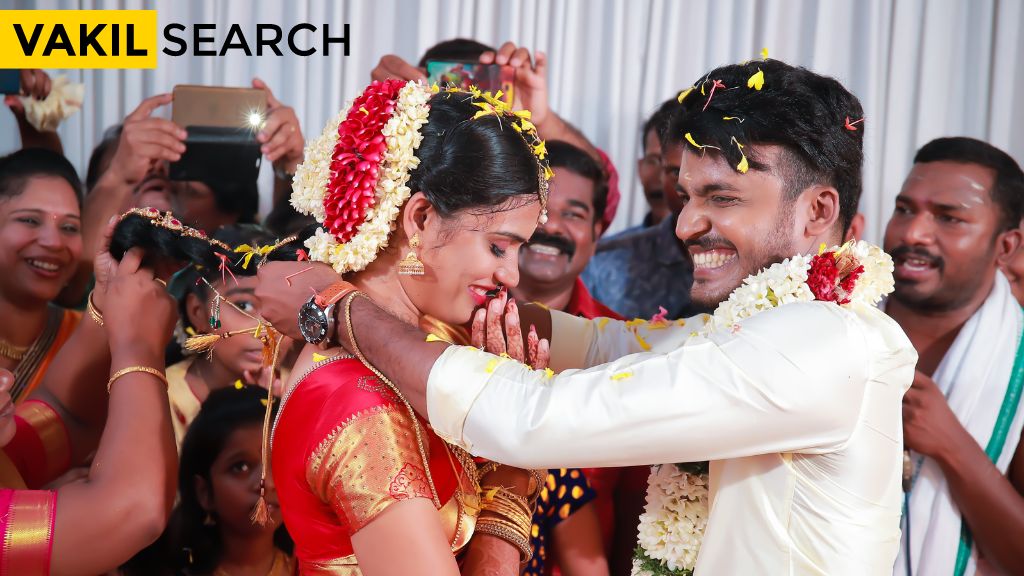Discover insights into muslim marriage act with our blog. Explore legal aspects and procedures, gaining a deeper understanding of these matrimonial laws.
Muslim marriage act in India differs vastly from the marriage laws of other religions. This article will explain all about muslim marriage act in India. Marriage in Islam, or Nikah, is not a sacrament (as in Hinduism), but a civil contract between a man and woman.
From a religious perspective, the Muslim Marriage Act in the Indian constitution is also a devotional act, i.e., ibadat. The Prophet states that marriage is obligatory (wajib) for every physically fit Muslim.
He said that marriage is equal to jihad (holy war) and that he who marries completes half his religion, while he can complete the other half by leading a virtuous life. Other schools of thought prescribe that the man must also have the means to earn a lawful livelihood, pay Mahr, and to support his wife and children.
Marriage also partakes in the nature of muamlat or worldly affairs and transactions among human beings. Marriage in Islam is a Sunnat, i.e., part of the practices and teachings practised by the Prophet himself. Islam forbids singlehood, monasticism, and celibacy.
Muslim Marriage Act in India – Formalities
But, the following requirements are compulsory:
- The pillars of the marriage are Ejab-o-Kubool, i.e., offer or proposal on the part of one party to the marriage and acceptance by the other party
- This free and mutual consent must be expressed in the same meeting in clear, unambiguous words
- If the parties are Hanafis then two witnesses need to be present. No witnesses are needed if the parties are Shias.
- Both the bride and groom must have attained puberty.
- Both the parties, i.e., the bride and groom or, when minor, their guardians, must be of sound mind
- The marriage should not be forbidden by the Muslim marriage rules of blood relationship, affinity or fosterage, differences in rank/social status or religion of the parties, prescription of iddat in case of remarriage of a woman, etc., depending upon the sect to which the parties belong.
Non-essential Customs
A Kazi reads the Nikah and recites the marriage sermon (extracts from the Quran and Hadis). There may be an exchange of gifts, guests offer prayers for the health and happiness of the couple. And additional Maulvis from both sides may be present.
But these practices may differ among different sects and are not essential legal requirements. Marriage Registration is not compulsory. But it may cause difficulties later with regard to proving the marriage.
Muslim Marriage Act in India – Legal Effects
As a result of a valid marriage, sexual intercourse between the couple becomes legal. The children born of the union are legitimate. As per the Muslim Marriage Act, the husband is bound to provide for the maintenance of the wife by way of food, clothing, lodging, and all such things as may be needed to support life so long as the wife is not a minor incapable of consummation, is faithful, lives with him, and obeys his reasonable orders, even if the wife has the means to support herself and the husband does not.
The husband also has a duty to provide for the children begotten of such marriage. Any terms and conditions stipulated in the marriage contract must be observed.
The wife is entitled to Dower or Mahr, a sum of money or other property from the husband as a mark of respect for the wife. The amount must be settled before or after marriage. It is payable either on-demand or on the dissolution of marriage by death or divorce.
Although different schools and sects have different rules regarding conditions of payment for the same and how or when the wife forfeits her right to the same. They can inherit property from each other. However, neither the husband nor the wife acquires any right over each other’s property simply because of the marriage.
Divorce in Muslim Marriage Act
As per the Muslim marriage act in India, Islam permits divorce, and either party can initiate it. The Quran forbids a man from seeking pretexts for divorcing his wife if she is obedient and faithful to him.
The Prophet curtailed the unbridled power of divorce by the husband and provided the same right to the wife to be exercised on reasonable grounds. The same has been provided for in The Dissolution of Muslim Marriages Act, 1939. The Prophet permits divorce but it is not encouraged. The marriage can also be dissolved by mutual consent.
The grounds and rules of Divorce vary for different sects. A minor married by his or her lawful guardian, other than the father or father’s father, can repudiate the marriage upon attaining puberty.
After divorce, cohabitation between the couple becomes illegal; once the divorce is final, they cannot inherit property from each other. The amount of Mahr remaining, if any, becomes payable. The wife is entitled to maintenance during the period of iddat.
Remarriage between the couple is possible only if the divorced wife observes iddat and remarries. The second marriage in Islam in India is consummated and voluntarily dissolved by the second husband, and the wife observes iddat again.
Remarriage
According to the Muslim Marriage Act, widows and divorcees have the freedom to marry again. In the event of the death of the husband or divorce, the woman must first observe a period of iddat, or a period of waiting, before she can remarry, irrespective of her age.
If the marriage was dissolved by divorce and had been consummated, then the period of waiting is of 3 courses of her menstrual cycle or, if pregnant, till the delivery of the child.
The waiting period is four months and ten days if the first marriage ends due to the husband’s death. It doesn’t even matter if the marriage was consummated or not. In the case of pregnancy, the waiting period is till the delivery of the child, whichever period is longer.
Polygamy in Islam
In Islam, monogamy is the general rule, while polygamy is only an exception. The Prophet did not favour polygamy except in exceptional circumstances. According to the Muslim Marriage act in India, a man can have up to 4 wives, but a woman can only have one husband at a time.
In India, the female population is low, and polygamy adds to the economic burden of supporting multiple wives and children.
Polygamy in the Muslim Marriage Act under Islam has not been abolished in India, but people do not widely practise it. You can find it in a particular clause in the marriage contract by those who find it morally offensive.
The groom, as well as the bride-to-be, may stipulate monogamy as a condition in the Nikahnama and, once signed, it requires the parties to not enter into any formal or informal marriage contract with another person.
Conclusion
Muslim Marriage Act is advisable that the bride and groom read this blog carefully and consider the points given. Every document and rules should be read carefully before signing. For any information, you can contact our experts at Vakilsearch.
Frequently Asked Questions
What are Muslim marriage rules?
Here are a few rules you should know:
- Marriage mirrors a contract with proposal (Ijab) and acceptance (Qubul), highlighting the importance of consent.
- Consent is vital in marriage, similar to contracts, and must be free from coercion or fraud.
- Minors wed by guardians have the right to annul the marriage upon reaching adulthood, aligning with puberty, known as khyar-ul-bulugh.
- Guardians' contracts for minors may be overridden upon reaching adulthood
- Marriage agreements are permissible if lawful and reasonable, not conflicting with religious beliefs
- Nikahnama terms can be adjusted within legal bounds according to the couple's wishes. Abdul Kadir v. Salima (1886) established Muslim marriage as contractual, not sacramental.
What are the 3 types of marriage in Muslim law?
There are actually four kinds of marriages: Sahih Nikah, which denotes a valid marriage; Batil Nikah, indicating a void marriage; Fasid Nikah, representing an irregular marriage; and Muta Marriage, referring to a temporary marriage. Each type carries its own legal implications and conditions within the context of Islamic jurisprudence
What is Section 2 of the Muslim Marriage Act?
Section 2 of the legislation addresses the entitlement of a woman married under Muslim Law to seek a decree for dissolution if her husband subjects her to assault or cruelty that significantly affects her well-being. Any act of cruelty by the husband that renders her married life unbearable is considered grounds for dissolution
Can two Muslims marry under Special marriage Act?
Regardless of religious affiliation, two individuals can enter into marriage under the Special Marriage Act provided specific conditions are met. However, the Act currently only permits marriage between a man and a woman, and it has not extended its provisions to include same-sex couples or transgender individuals.
Also, Read:











